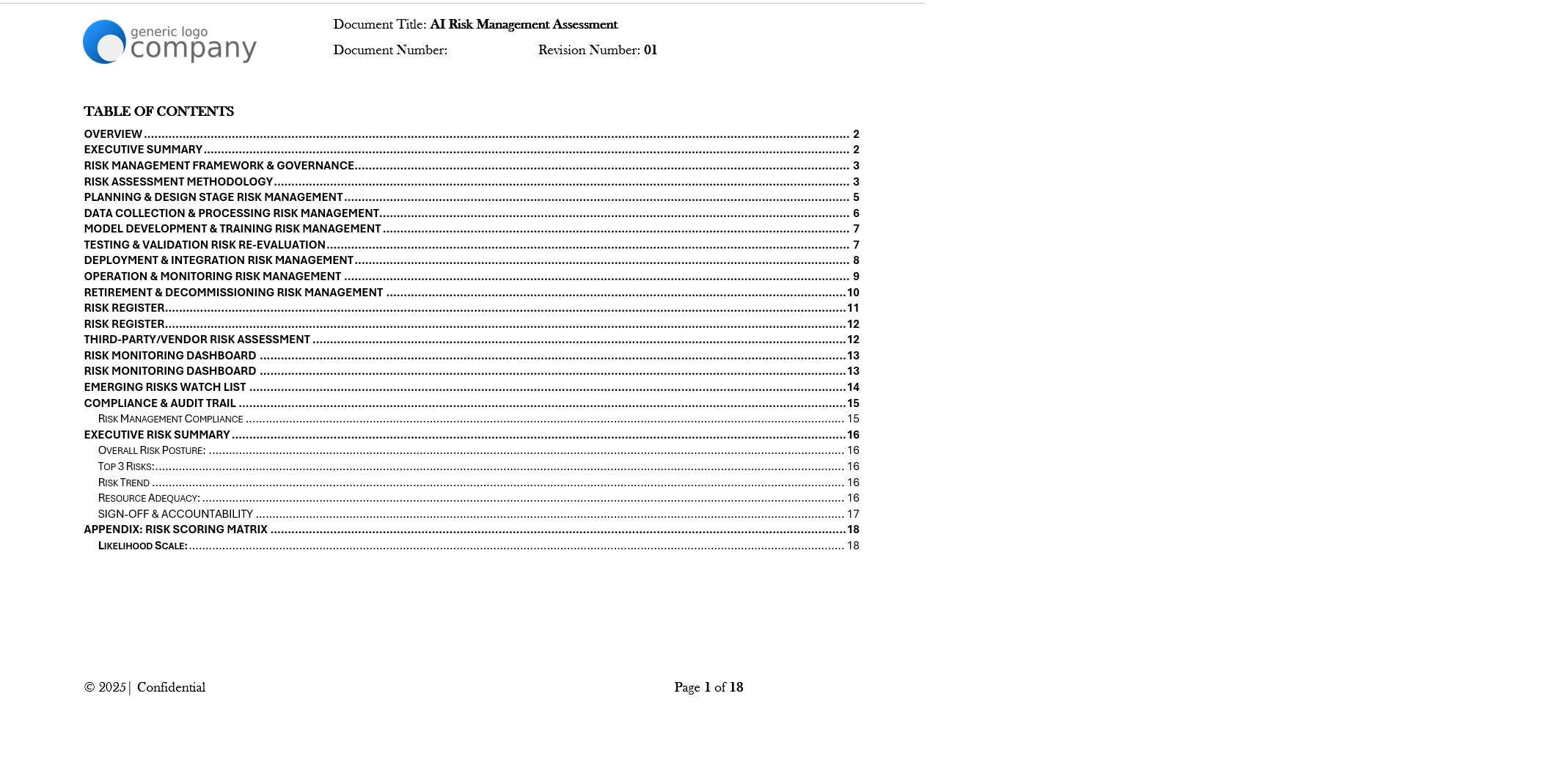
- Version
- Download
- File Size 0.00 KB
- File Count 0
- Create Date August 24, 2025
- Last Updated August 24, 2025
AI Risk Management Assessment Checklist — Governance, Risk & Audit Tool
AI Risk Management Assessment Checklist
Subtitle: Assess and document AI risks across design, data, testing, deployment, and monitoring with compliance-ready governance tools.
Assess Your Programs Risk Management Governance: [Download Now]
Conversion Layer
Intro:
AI systems introduce unique risks that must be continuously identified, measured, and managed to meet regulatory and ethical standards. The AI Risk Management Assessment Checklist provides organizations with a structured, audit-ready tool for evaluating risks across the full AI lifecycle, ensuring compliance with the EU AI Act, NIST AI RMF, and ISO/IEC 42001.
Key Benefits:
-
✅ Lifecycle Risk Coverage: From planning and design to monitoring and retirement.
-
✅ Compliance Ready: Mapped to EU AI Act, ISO/IEC 42001, NIST AI RMF, and ISO/IEC 23894.
-
✅ Governance Built-In: Defines roles, risk owners, approval chains, and sign-offs.
-
✅ Quantitative & Qualitative Methods: Supports reproducible and evidence-based assessments.
-
✅ Audit Support: Includes dashboards, scoring matrices, evidence logs, and version control.
Who Uses This?
Risk managers, compliance officers, governance committees, and AI assurance teams preparing for internal audits, ISO certification, or AI Act conformity assessments.
SEO Depth Layer
Why This Matters
AI systems can expose organizations to regulatory fines, operational risks, and reputational damage if risks are not actively managed. The EU AI Act mandates continuous, iterative risk management for high-risk AI systems. This checklist provides organizations with a comprehensive and repeatable framework to classify, monitor, and mitigate AI risks while maintaining an audit trail.
Framework Alignment
This checklist supports:
-
EU AI Act — Continuous risk management, classification, and documentation for high-risk AI systems.
-
NIST AI RMF — Structured methodology for risk identification, prioritization, and monitoring.
-
ISO/IEC 42001 & 23894 — Governance and risk management standards for AI systems.
-
ISO/IEC 27001 & NIST SP 800-53 — Security and cyber resilience integration.
-
OECD AI Principles — Human oversight, accountability, and transparency.
Key Features
-
Governance & Risk Framework: Establishes AI-specific risk processes within enterprise risk management.
-
Risk Assessment Methodology: Uses quantitative (statistical, stress testing) and qualitative (expert judgment) methods.
-
Planning & Design Controls: Preliminary assessments and ethical, legal, technical risk reviews.
-
Data, Training, and Testing Stages: Risk checkpoints during data collection, model training, and validation.
-
Deployment & Monitoring: Risk reviews during release, operations, and ongoing monitoring.
-
Third-Party Oversight: Dedicated vendor risk assessment for supply chain assurance.
-
Risk Register & Dashboards: Centralized logs with compliance scoring and emerging risk watchlists.
-
Audit & Compliance Trail: Required evidence/artefacts, approval chains, and sign-offs included.
Comparison Table
| Feature | Generic Risk Checklist | AI Risk Management Assessment (Pro) |
|---|---|---|
| Lifecycle coverage | Partial | Full lifecycle (design → monitoring → retirement) |
| Governance roles | Vague | Defines risk owners, approval chains, RACI accountability |
| Methodology | Basic | Quantitative + qualitative + reproducible |
| Framework references | None | EU AI Act, NIST AI RMF, ISO/IEC 42001, ISO/IEC 23894 |
| Vendor/third-party AI oversight | Absent | Dedicated vendor risk assessment + audit controls |
| Audit support | Minimal | Risk register, dashboards, evidence checklists |
FAQ Section
Q1: Which frameworks does this checklist align with?
A: It references the EU AI Act, NIST AI RMF, ISO/IEC 42001, ISO/IEC 23894, and ISO/IEC 27001.
Q2: Does it cover the entire AI lifecycle?
A: Yes. It provides risk assessment checkpoints from planning and design through deployment, monitoring, and retirement.
Q3: What assessment methods are supported?
A: Both quantitative (statistical modeling, stress testing) and qualitative (expert review, stakeholder input) methods are included.
Q4: Does it include third-party and vendor AI risk?
A: Yes. It has a dedicated vendor/third-party risk assessment module with compliance evidence requirements.
Q5: Does it help prepare for audits?
A: Yes. It includes an audit trail, evidence repository checklist, approval chain, and version history.
Q6: What is the best way to view and use this checklist?
A: Documents are best viewed and used via Microsoft Word or Microsoft Excel. Formatting may not fully display in Google Docs or other editors.
Ideal For
-
Risk Management & Audit Teams
-
Chief AI Officers (CAIOs)
-
Governance & Compliance Committees
-
Data Science & ML Leadership
-
Enterprise Security & Legal Functions
-
Vendor Risk Management Teams





